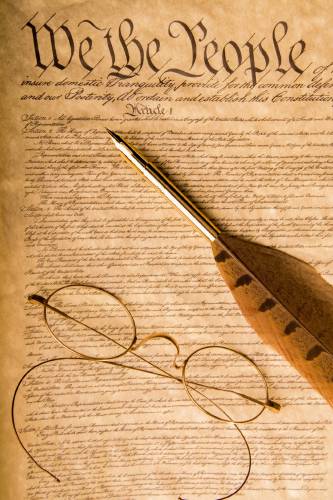Paul M. Craig: Blending Puritan and Anglican piety with Enlightenment thinking

Replica of the Constitution of the United States. Photopa1
| Published: 03-06-2024 6:11 PM |
During these holy and fasting days celebrating the story of Jesus, especially his resurrection and thus the beginning of Christianity, we might ask is the United States a Christian nation? By population, of course.
Christians outnumber everyone else by a ratio of about four to one. Besides, all the men who wrote the U.S. Constitution in the summer of 1787 were Christians. Still, critics of the Constitution complained that it failed to include specific language that would found America as a Christian nation; even worse, it prohibited — in Article VI, last clause — any religious test to hold public office.
But we must also consider that seven states still had tax-supported, established Christian religions. And, despite the Constitution, most states did have religious tests for public office to ensure that only proper-thinking Protestant Christians would assume positions of public trust.
Conversely, the Framers did cite secular Enlightenment sources about nine times more often than they cited Christian religious sources to support their handiwork.
There’s a logical reason here: Christianity was centuries old and familiar; the Framers had no need to trot out old horses.
But the scientific, empirical and rational ideas of Enlightenment thinking were brand new and unfamiliar. Thus, when the Framers followed this manner of thought to create the Constitution, it clarified their reasoning if they cited leading European thinkers of the Enlightenment to support both the Constitution and its ratification.
The Framers blended Puritan and Anglican piety with Enlightenment rationality to separate the civil authority from the religious authority. But they did not banish religion from public or governmental life; they simply said the two areas of human understanding of Nature could no longer provide symbiotic support for tyrants.
So, rather than narrowly creating a Christian Nation, the Constitution provided pluralistic guidance to accommodate all religious ideas because they helped answer that most basic question of human existence: How do we behave toward one another?
Article continues after...
Yesterday's Most Read Articles
 The Iron Horse rides again: The storied Northampton club will reopen at last, May 15
The Iron Horse rides again: The storied Northampton club will reopen at last, May 15
 Homeless camp in Northampton ordered to disperse
Homeless camp in Northampton ordered to disperse
 Authorities ID victim in Greenfield slaying
Authorities ID victim in Greenfield slaying
 $100,000 theft: Granby Police seek help in ID’ing 3 who used dump truck to steal cash from ATM
$100,000 theft: Granby Police seek help in ID’ing 3 who used dump truck to steal cash from ATM
 UMass football: Spring Game closes one chapter for Minutemen, 2024 season fast approaching
UMass football: Spring Game closes one chapter for Minutemen, 2024 season fast approaching
 Final pick for Amherst regional superintendent, from Virgin Islands, aims to ‘lead with love’
Final pick for Amherst regional superintendent, from Virgin Islands, aims to ‘lead with love’
Paul M. Craig
Northampton

 Guest columnist John Sinton: ‘In tears for both Jew and Palestinian’
Guest columnist John Sinton: ‘In tears for both Jew and Palestinian’ Sidney Moss: Trial showing that no one is above the law
Sidney Moss: Trial showing that no one is above the law Steve Smith: Rose for Worthington Selectboard
Steve Smith: Rose for Worthington Selectboard Araceli Katalin McCoy: Why we should change the voting age to 16
Araceli Katalin McCoy: Why we should change the voting age to 16
